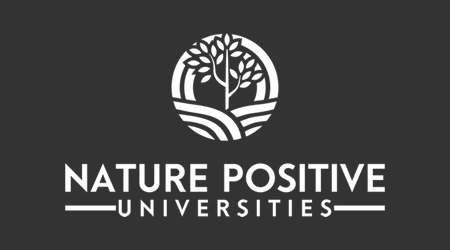« India celebrates its Republic Day 2023. | Main | Canon joins the Content Authenticity Initiative (CAI) »
January 29, 2023
Oxford leads Nature Positive Universities Alliance to reverse Biodiversity Decline.


Oxford, UK. January 29, 2023 — At the UN Biodiversity Conference (COP15), the University of Oxford and the UN Environment Programme (UNEP) announced the launch of the Nature Positive Universities Alliance. It is a global network of universities that have officially pledged to advance efforts to halt, prevent and reverse nature loss by addressing their impacts and restoring ecosystems harmed by our activities. This push is part of the UN Decade on Ecosystem Restoration, a movement to avert climate catastrophe and mass extinction.
The Nature Positive Universities Alliance brings higher education institutions together to use their unique power and influence as drivers of positive change. Universities already carry out environmental and conservation research to help inform government and company activities. However, by publicly tackling their supply chains and operational impacts on nature, universities can help guide the broader community on a path to address the triple planetary crisis of climate change, biodiversity loss, and pollution.
“The University of Oxford has an environmental sustainability strategy with dual targets of net zero carbon and a net gain in biodiversity by 2035. These targets for large institutions are challenging to achieve. But through collaboration and idea-sharing with other universities via the Nature Positive Universities Alliance, we can collectively progress towards achieving net biodiversity gain,” said Harriet Waters, Head of Environmental Sustainability at the University of Oxford.
The initiative, a part of the UN’s Decade on Ecosystem Restoration, was initially launched by 117 universities from 48 countries, which made individual pledges to address their impacts on nature. University pledges include four key elements:
- Carrying out baseline assessments;
- Setting specific, time-limited, and measurable targets for wildlife;
- Taking bold action to reduce biodiversity impacts and protect and restore species and ecosystems while influencing others to do the same;
- Transparent annual reporting.
The initiative builds on the University of Oxford’s experience setting an ambitious target for net biodiversity gain by 2035 alongside net zero commitments.
E.J. Milner-Gulland, Tasso Leventis Professor of Biodiversity at the Department of Biology, University of Oxford, and co-founder of the Nature Positive Universities Alliance, said: “As universities, we occupy a unique position in educating future leaders, researching solutions to environmental challenges, and influencing our communities and governments. By addressing our own institutions’ environmental impacts, we can be powerful thought leaders while directly contributing to restoring nature.”
All the founding universities announced that they have pledged to assess their impacts to determine the most impactful initiatives to introduce and to report on their progress. Examples of initiatives so far have included:
Establishing nature-friendly infrastructure such as ecological corridors at the University of Buenos Aires, Argentina, and the University of Campinas, Brazil, and new green walls at the UK’s University of Lincoln to support pollinators.
Contributing to afforestation and restoration by developing institutional forests at Government Dungar College in Bikaner, India, and the University of Aveiro, Portugal.
Completing university-wide surveys and audits of biodiversity at the University of Turku, Finland, and increasing biodiversity at the all University of Melbourne campuses.
Improving supply chain through sustainable catering, such as reducing food waste and more sustainable menus at the University of Oxford and producing high-quality farmed produce on its land to supply university canteens at Ahmadu Bello University, Nigeria.
Commitments to improve operational footprints, such as achieving Green Lab accreditation across the all University of Exeter laboratories.
Establishment of regional hubs of universities collaborating towards a nature-positive goal in Algeria, Nigeria, India, and Canada.
People from 408 different universities are:
- Already a part of the more comprehensive network.
- Playing their role in bringing their universities closer to meeting environmental targets by developing research.
- Lobbying their senior management.
- Sharing case studies of their activities.
The network also includes a Student Ambassador Programme, which totals over 100 students from across 35 countries who are taking action toward nature-positive awareness and approaches on their campuses. In addition, they are encouraging their universities to make an institutional pledge through advocacy and organization of nature-positive activities such as volunteering for nature restoration, establishing sapling nurseries, and using their studies to advance their institutions’ sustainability further.
Sam Barratt, Chief of Youth, Education, and Advocacy at the UN Environment Programme, said: “Universities live at the heart of cities, at the crossroads of students’ futures and provide ground-breaking research that educates and informs society. We are delighted to see Universities will be joining hands to reset our relationship with nature so that, through this Alliance, we create new actions and possibilities. The virtue of higher education has come from a reappraisal of the present to steer the world to a new future. So we look forward to seeing how the Nature Positive Universities Alliance does just that for this agenda.”
The Nature Positive Universities Alliance calls on other universities worldwide to join its collaborative network and make institutional pledges.
Universities that have recently joined include, among others, the University of Helsinki, Finland; University College, Cork, Ireland; Durham University, McGill University, Canada; Bundelkhand University, Jhansi, India; University of California UCLA, USA; University of Bremen, Germany; Universidad Autonoma de Madrid; Universite de Geneve; UNSW Sydney, Australia; Carl von Ossietsky Universitat Oldenburg; The University of Faisalabad, Pakistan; University of Punjab, Lahore, Pakistan; Independent University, Bangladesh; UC Berkeley, USA; University of Melbourne, Australia; Punjabi University, Patiala, India; Panjab University, Chandigarh, India; OP Jindal Global University, Sonepat, India; and Indira Gandhi National Open University, Delhi, India, for example.
Source: University of Oxford
|GlobalGiants.Com|
— The editor is an “Oxford University Associate Alumnus.”
Nature Positive Universities
The Nature Positive Universities Alliance is a global network of universities prioritizing nature restoration. Launched by the United Nations Environment Programme (UNEP) and the University of Oxford in partnership with the UN Decade on Ecosystem Restoration.







Edited & Posted by the Editor | 9:16 AM | Link to this Post







